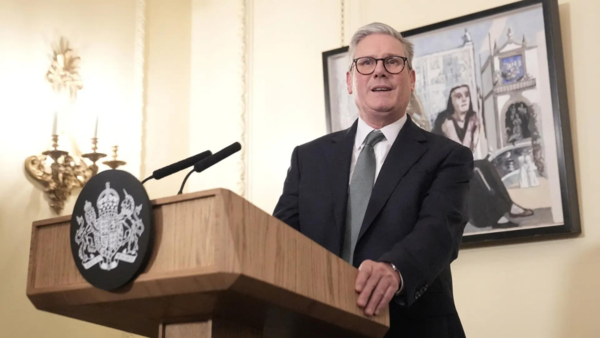Elon Musk’s explosive critique of the UK’s handling of grooming gang scandals landed like a perfectly timed yorker, leaving Keir Starmer on the backfoot and scrambling to defend his record. As Musk’s tweets turned up the heat, calling for reforms and justice, Starmer was forced to step out of his defensive crease, recounting his efforts as England’s former Director of Public Prosecutions. But much like facing an unpredictable pacer, the Labour leader found himself fielding questions not just about systemic failures but also his ability to handle Musk‘s high-profile hectoring on social media.
Starmer’s Defense: Addressing Systemic Failures

Facing criticism, Starmer defended his record during his tenure as Director of Public Prosecutions (DPP) from 2008 to 2013. Responding to Musk’s accusations that he failed to act decisively on grooming gangs, Starmer emphasized his efforts to reform the Crown Prosecution Service (CPS), including reopening closed cases and prosecuting grooming gangs, such as the notable Rochdale case.
“I tackled this head-on,” Starmer said at a recent press conference. “We changed the prosecution approach to challenge the myths and stereotypes that had prevented victims from being heard.” He also condemned Musk’s language, particularly his attack on Jess Phillips, a government minister, whom Musk labeled a “rape genocide apologist.” Starmer stated, “When the poison of the far-right leads to serious threats to Jess Phillips and others, then a line has been crossed.”
The Rotherham Scandal: A National Shame

The Rotherham child sexual exploitation (CSE) scandal remains one of the UK’s most harrowing examples of institutional failure. Between 1997 and 2013, an estimated 1,400 children—some as young as 11—were subjected to sexual abuse, trafficking, and intimidation, often by grooming gangs of predominantly Pakistani heritage. Victims faced repeated rape, psychological coercion, and violence, with some girls threatened with immolation or forced to witness brutal assaults to ensure their silence.
Despite repeated warnings, systemic failures allowed the abuse to continue unchecked. Reports from frontline workers were dismissed, and concerns about the perpetrators’ ethnic background led to reluctance among officials to act. A 2014 report by Alexis Jay highlighted “blatant collective failures” in protecting vulnerable children. “Seminars presented the issue in explicit terms,” the report noted, “yet no clear plan of action emerged.”
The Quantum of the Scandal
The scale of abuse across England is staggering. Official figures estimate that between 2017 and 2022, over 15,000 children were at risk of sexual exploitation annually. In Telford, over 1,000 girls were reportedly abused over four decades, and allegations of police collusion and political cover-ups remain unresolved. A 2021 government report revealed that over 70% of perpetrators in high-profile cases were of South Asian heritage, highlighting the role of cultural dynamics in enabling the abuse. Critics argue that political correctness played a significant role in enabling these crimes. A fear of being labeled racist or Islamophobic led many officials to downplay the perpetrators’ ethnic backgrounds. Some professionals reported being explicitly directed not to record ethnicity in official documents. This reluctance created an environment where victims were ignored, and predators acted with impunity.
Additionally, institutional weaknesses compounded the issue. Police and social services often failed to act on evidence, while political leaders prioritized reputational concerns over child protection. The Alexis Jay report condemned this inaction, stating that “political and officer leadership” failed repeatedly to address the crisis.
Reforms and Actions Taken
Following the revelations, several reforms have been introduced:
- Strengthened Risk Assessments: Councils now implement consistent, high-quality risk assessments for children affected by CSE.
- Specialized Multi-Agency Teams: Teams combining police, social workers, and healthcare professionals have been established to improve coordination and accountability.
- Community Engagement: Efforts to engage minority communities have been expanded to foster dialogue and raise awareness about abuse reporting mechanisms.
- Post-Abuse Support: Victims receive long-term therapeutic and practical support, including access to Sexual Assault Referral Centers (SARCs).
- Enhanced Accountability: Regular multi-agency audits and independent safeguarding boards ensure sustained improvements.
- Training and Awareness: Comprehensive training for frontline workers focuses on identifying grooming and understanding cultural dynamics.
Despite these efforts, challenges persist. Prosecutions remain limited, and financial pressures on local councils threaten the sustainability of safeguarding services.
Musk’s Critique and the Role of X
Musk’s intervention has reignited public interest in grooming gang scandals, using X to amplify outrage. Social media’s decentralized nature has exposed institutional failures that traditional media often overlooked. Musk’s populist rhetoric—including his demand for a public inquiry—has tapped into widespread frustration with political and bureaucratic inaction.
However, his language has drawn criticism. Starmer accused Musk of spreading “lies and misinformation,” particularly regarding unsubstantiated claims about “two-tier policing” and political cover-ups. Critics warn that while social media can illuminate hidden injustices, it also risks sensationalism and misinformation.
Social Media and the Democratization of Accountability
Platforms like X have reshaped the narrative around grooming gangs, empowering victims, whistleblowers, and activists to expose failures. However, this democratization of information comes with challenges. Misleading posts and polarizing rhetoric can undermine constructive discourse and exacerbate societal divisions.
The Path Forward: Transparency and Reform
Advocates, including Conservative leader Kemi Badenoch, have called for a comprehensive national inquiry into grooming gangs. Blair Gibbs, a criminal justice expert, has proposed creating a national policing unit within the National Crime Agency to investigate historic and ongoing cases. These measures aim to address systemic failures and provide justice for victims.
“Once we lose the anchor that truth matters,” Starmer warned, “then we are on a very slippery slope.” His remarks underscore the urgency of restoring trust in public institutions and ensuring that such atrocities are never repeated. Social media’s spotlight makes secrecy impossible, demanding a new era of transparency and accountability in British governance.




